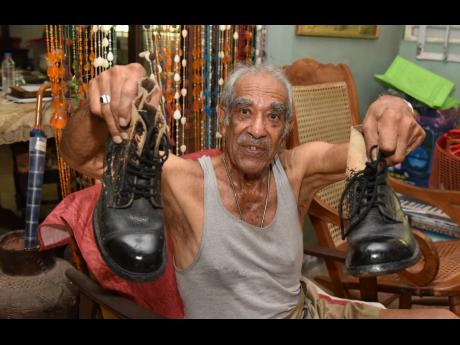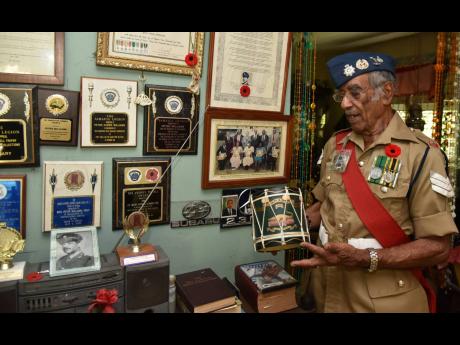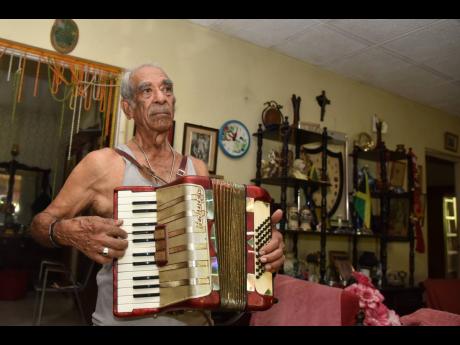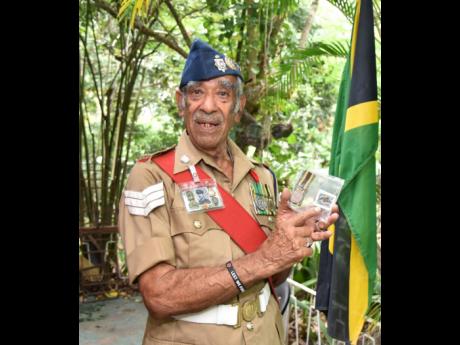‘I raise the flag high everywhere I go’
Teen runaway-turned-army sergeant reflects on landing role in Independence festivities, decades of service
Retired Sergeant Peter Xavier Williams, who assisted in hoisting the Jamaican flag on August 5, 1962, an hour before midnight, signalling Jamaica's political Independence, says it was a privilege to play a role in the joyous and historic occasion.
Jamaica had previously been ruled by Britain for more than three centuries, but as the Union Jack, which had been flown half-mast, was being lowered, making way for the ascension of the Jamaican flag for the very first time, the people gathered in their numbers and fireworks were sent charging through the air in an explosion of colourful lights, Williams recalled.
The retired army officer was in charge of raising the flag of the new nation at the Jamaica Defence Force (JDF) headquarters to coincide with the official ceremony taking place at the National Stadium.
Williams has been playing the piano accordion for 60 years, which coincides with Jamaica's 60th year of independence. Additionally, he has experimented with other instruments such as the trumpet and harmonica.
For Williams, there was “a lot of excitement” in and around the former four-acre military camp known as Parade in the heart of the capital city – which was also called Victoria Park but later renamed St William Grant Park in 1977 – which was “decorated with all sorts of flags and coat of arms”.
Many Jamaicans who could not be accommodated inside the stadium had congregated to what appeared to be the next best location in the heart of the capital city.
The black, gold, and green flag, which has been flying high from that point on, continues to symbolise Jamaica and the strength and creativity of its people.
“It was a great time. I felt good because I was a part of it,” he said.
Williams, a “runaway boy” from Annotto River, St Mary, was born in 1933 to an Indian immigrant father and a second-generation Jamaican mother of Indian descent and seemed destined to serve his country.
He recalled that at the age of 13, he was determined to leave behind his poverty-stricken life. On his second attempt, he was successful in running away from home, venturing through the hills and making his way to Kingston.
His journey landed him a seat in front of Alexander Bustamante, the future prime minister who was then mayor of Kingston, in 1947.
Williams explained his need for assistance as his mother became unable to care for him and his siblings due to his father death when he was seven years old.
Bustamante's driver then took the lad to the Alpha Boys' School, and while there, he began dreaming of becoming a soldier.
ROSE THROUGH RANKS
Williams joined the army and rose through the ranks, first as a mere scout to scout leader and eventually scout master.
In 1952, the 19-year-old Williams joined the Jamaica Battalion (later known as the Jamaica Local Force) and was trained as a drummer and medical orderly.
He then joined the Royal Corps of Signals, a highly regarded branch of the British army with a unit in Jamaica, and later transferred to the West India Regiment (WIR) up until its disbandment on July 30, 1962. His services were transferred to the JDF, which was formed the next day. There, he served as a chief photographer, sergeant, postmaster, and supervisor of the JDF telephone exchange.
After 25 years in the army, he retired in 1978 with two certificates for exemplary conduct and later undertook voluntary service at the Jamaica Legion, where he was widely known as the 'Poppy Man'.
“I raise the flag high everywhere I go,” said the 89-year-old, adding that he will continue to do so until death or sickness immobilise him.
Williams still treasures the boots he wore every day during service since 1952. His pride in serving his country is reflected in these and other mementos and he periodically takes out the boots to give them a cleaning in case he is called out for ceremonial events.
An avid musician, Williams has been playing the piano accordion for 60 years, which coincides with Jamaica's Diamond Jubilee. Additionally, he has experimented with other instruments such as the trumpet and harmonica.
“I just love music. I love making glorious music on to God,” he declared, adding that in addition to serving his country, he was also a soldier for God and would use music to minister.
The retired army man was honoured in the House of Representatives in 2016 for his services to Curphey Home, which was founded by the Jamaica Legion to meet the needs of war veterans in their senior years and for which he had been raising money since 2005 by selling poppies.
He was awarded the national Badge of Honour in 2008 for long and faithful service.
In 2021, Williams was presented with a chief of defence staff's commendation for his consistent and significant service to the JDF and Jamaica Legion since 1962.
HONOURED TRADITION
Williams also participated in community-engagement initiatives throughout his time as a civilian, particularly at the Annotto Bay Hospital Restoration Committee. He also twice revitalised the Annotto Bay Branch of the Jamaica Legion.
Additionally, he helped with the provision of flags and flagpoles at locations such as the Long Road All-Age School, Annotto Bay's town plaza, and the Cenotaph at the parish capital, Port Maria.
Williams has been raising the Jamaican flag at the 32-foot flag pole he erected in the square in Gordon Town, St Andrew, every Independence Day since 1978.
On Saturday, August 6, he will continue that tradition.
“Wearing this uniform, I feel proud ... and at 90, March coming, I am still feeling strong and can be involved in any ceremonial occasion that my service might be called,” he said.
But Williams bemoaned the reality that the celebrations are not what they once were, owing to the crime and violence that have diminished the nationalism and pride of Jamaicans during Emancipation and Independence festivities.
The criminals, he said, have decreased the number of enthusiastic individuals who are prepared to “keep the flag going”.
He noted that unless the crime crisis is brought under control, the country would not prosper in the manner it aspires to.
“All those who suffer from crime and violence cannot say 'Jamaica land we love',” he added.
He, therefore, wishes for Jamaicans to be able to enjoy peace and harmony in their own country, where they can conduct business, raise their families, and give God the glory.
“[But] unless we can get rid of those few ['bad eggs'] by whatever means, we will have a hard time getting there,” he said.




